توضیحات
Postcoloniality in corporate social and environmental accountability
مقاله انگلیسی حسابداری مسئولیت اجتماعی
پس از استعمار در پاسخگویی (مسئولیت) اجتماعی و محیطی شرکت ها
Chandana Alawattage a, *, Susith Fernando b
a Accounting and Finance, University of Aberdeen Business School, Edward Wright Building, Dunbar Street, Aberdeen AB24 3QY, UK
b Toi Ohomai Institute of Technology, Rotorua, New Zealand
Article history:
Received 5 March 2015
Received in revised form
۵ July 2017
Accepted 10 July 2017
Available online 19 July 2017
Accounting, Organizations and Society
چکیده مقاله انگلیسی حسابداری مسئولیت اجتماعی
a b s t r a c t
Using a discourse analysis of interviews with corporate managers and their published corporate sustainability information,
this paper argues that corporate social and environmental accountability (CSEA) in a postcolonial context (Sri Lanka) is a textual space wherein local managers create a hybrid cultural identity through mimicking.
It examines how local managers embrace and appropriate global discourses to reimagine their local managerial circumstances.
They deploy a set of textual strategies e imitation, redefinition, innovation,
and codification e to translate CSEA into a hybrid ‘textual(real)ity’ (i.e., interspace and duality between accounting text – textuality – and material practices – reality) whereby the global context is textualized as local and the local is contextualised as global.
Nationalism, cultural ethics,
and poverty enter this textual(real)ity as discursive elements that reactivate locality.
A cultural notion of philanthropic giving, dana, gives local cultural authenticity to this textual(real)ity while the national politico-economic identity of poverty textualizes CSEA as a national development strategy.
The paper also critiques whether these postcolonial dynamics can promote agonistic accountabilities.
It contributes to the accounting literature on postcolonialism, imperialism, and globalization discourses.
۱٫ Introduction
Critical accounting literature has been very receptive to theoretical developments in other fields, but very few draw on postcolonialism
(e.g., Annisette, 1999, 2000, 2003; Annisette & Neu, 2004; Gallhofer, Haslam, & Kamla, 2011; Kamla, 2007).
These few provide interesting insights into how colonial and postcolonial histories have shaped the accounting profession,
accounting education, and management control systems in postcolonial contexts.
However, they have not addressed the cultural agency of the colonized sufficiently, which this paper does by explaining how
such agency is central to reproducing accounting practices in postcolonial social spaces. In doing so, like Thomson and Jones (2016),
we introduce Homi Bhabha’s postcolonial theory into accounting literature and provide an alternative theoretical interpretation of how western CSEA is culturally reproduced in peripheral countries.
Keywords:
Postcolonialism
Social and environmental accountability
Sri Lanka
Homi Bhabha
Agonistics
Globalization discourses
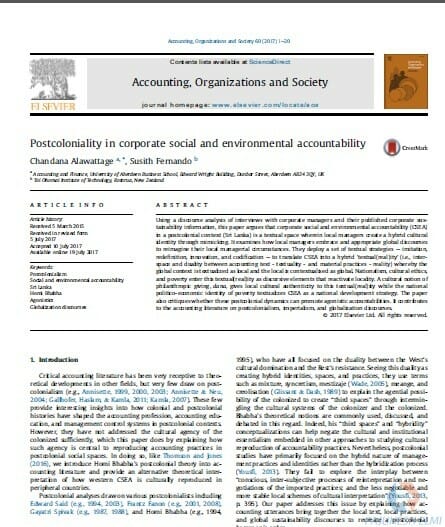
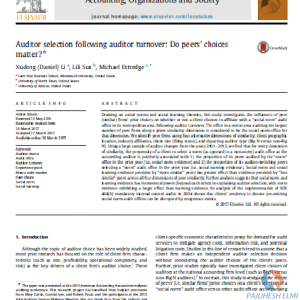
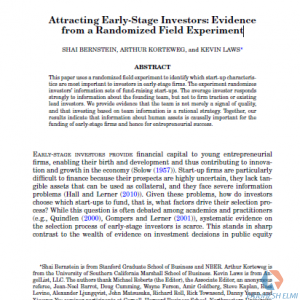
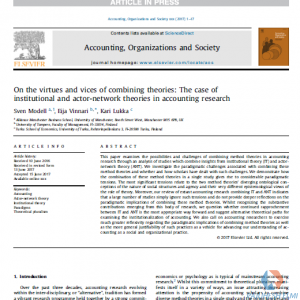
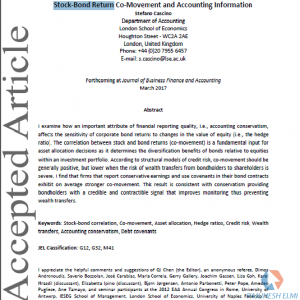
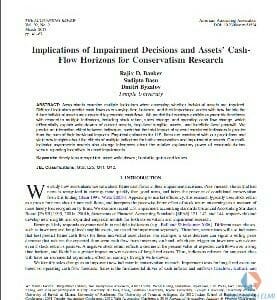
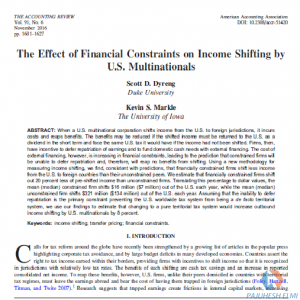
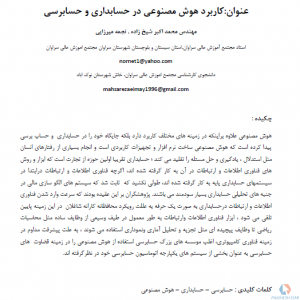
نقد و بررسیها
هیچ دیدگاهی برای این محصول نوشته نشده است.